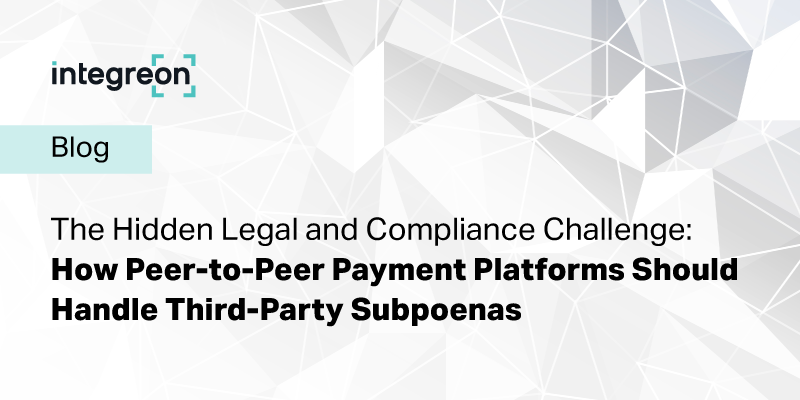Peer-to-peer (P2P) payment platforms have become the financial backbone of digital life, enabling billions of dollars to move instantly across borders and social circles. But with that ubiquity also comes scrutiny. As criminal investigations increasingly intersect with digital transactions, subpoenas directed at P2P platforms are on the rise.
For these platforms, subpoena response isn’t just a legal formality, it’s a test of operational maturity and data governance.
Why Subpoenas Are Rising for Peer-to-Peer Platforms
Criminal activity increasingly targets digital payments
Fraud rings, money mules, and cybercriminals have adapted to the convenience of instant transfers. P2P payment systems can be exploited for scams, laundering, or other illicit activities, making them a focal point in both criminal and civil investigations. As regulators and investigators follow the digital money trail, P2P data becomes vital evidence.
Law enforcement sees P2P platforms as key data sources
Because platforms maintain detailed transaction histories, account identifiers, and device metadata, they’re viewed as a goldmine for investigative leads. Requests that once went to banks or telecom providers are now directed to payment apps often at high velocity and with varied urgency.
Investigations rely on fast access to user transaction details
Speed matters. When subpoenas involve time-sensitive cases such as fraud, child exploitation, or terrorism financing, delays can have real-world consequences. Agencies expect accurate, rapid response putting pressure on compliance teams to process requests efficiently and lawfully.
Internal Legal Teams Face Structural Limits
High request volumes strain already stretched legal teams
Many P2P platforms are still operating with legal infrastructures designed for traditional corporate workflows, not the flood of daily law enforcement requests. Each subpoena may demand case-by-case review, verification, and documentation which can be a costly and repetitive drain on internal capacity.
Inconsistent formats and timelines create process friction
Requests often arrive via fax, email, or online portals, each with its own requirements, deadlines, and point of contact. Without a centralized system for intake and tracking, even well-intentioned teams can miss deadlines or overlook key details.
Errors or delays carry legal and reputational risks
Failure to comply properly, whether by producing the wrong data or missing a response deadline, can result in court sanctions, penalties, or public criticism. Given the public trust P2P platforms depend on, reputation is as much at stake as regulatory compliance.
Why Working with a Subpoena Compliance Partner Makes Sense
Centralized intake and tracking response status ensures consistency
An external partner specializing in subpoena and law enforcement response can consolidate the entire workflow from receipt to production into a single, trackable process. This reduces duplication, improves auditability, and assists in operational status based tracking.
Experts understand legal nuances and escalation protocols
Trained subpoena specialists know the difference between criminal, civil, and regulatory requests; how to assess jurisdictional authority; and when to escalate sensitive cases to counsel. That expertise protects platforms from overproduction and ensures privacy standards are met.
Improves speed and accuracy without draining internal resources
Outsourced teams can operate around the clock, providing surge capacity when request volumes spike. They use standardized templates, data extraction protocols, and legal review layers that maintain both compliance and consistency freeing in-house lawyers for higher-value tasks.
What P2P Providers Should Look For
Experience with financial and tech-driven subpoena workflows
Partners should have demonstrable expertise in managing subpoena compliance for large-scale data-driven organizations, particularly those balancing consumer privacy with legal obligations.
Support that aligns with your systems and security standards
Integration matters. The best partners mirror a platform’s internal data handling and security controls, including encryption, access management, and chain-of-custody tracking. Solutions include working 100% behind client firewalls where your customers data stays within your environment and controls until response production.
Clear SLAs, defensibility, and audit-ready documentation
A strong subpoena response function is measurable. Look for partners who offer service-level commitments, maintain detailed logs of every action taken, and can produce audit-ready records to demonstrate defensibility if challenged in court.
Turning Compliance from Burden to Advantage
Reduce operational risk and increase regulatory confidence
Efficient subpoena handling minimizes compliance gaps and demonstrates to regulators and law enforcement that your organization takes transparency and law enforcement cooperation seriously.
Protect user privacy while meeting legal obligations
The right processes ensure that only appropriate data is disclosed, maintaining trust with users while fulfilling lawful requests — a balance increasingly valued by both regulators and consumers.
Free internal teams for higher-impact legal and compliance work
By outsourcing repetitive, high-volume subpoena response tasks, internal teams can refocus on proactive risk management, regulatory strategy, and data governance, turning a reactive obligation into a strategic advantage.
The subpoena landscape for P2P platforms will only grow more complex as digital finance expands. Establishing a robust, scalable compliance operation, one that blends technology, process discipline, and specialized expertise, is not optional. It’s the foundation of responsible platform governance and sustained trust in the era of real-time payments.


